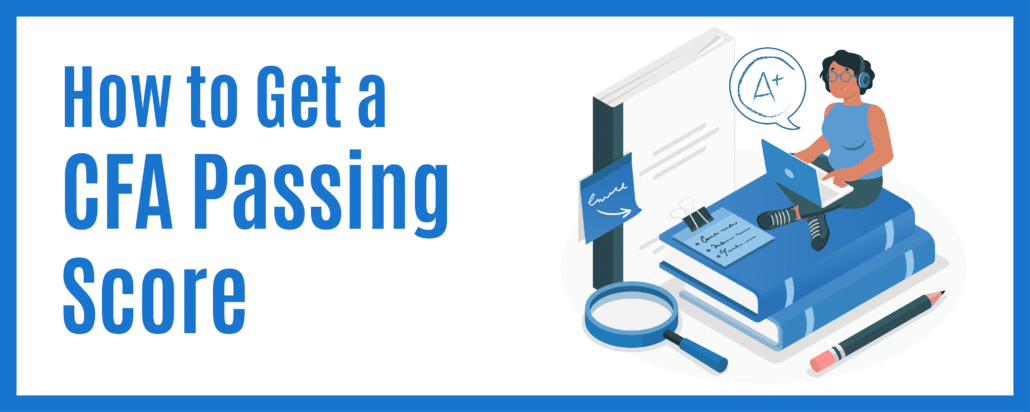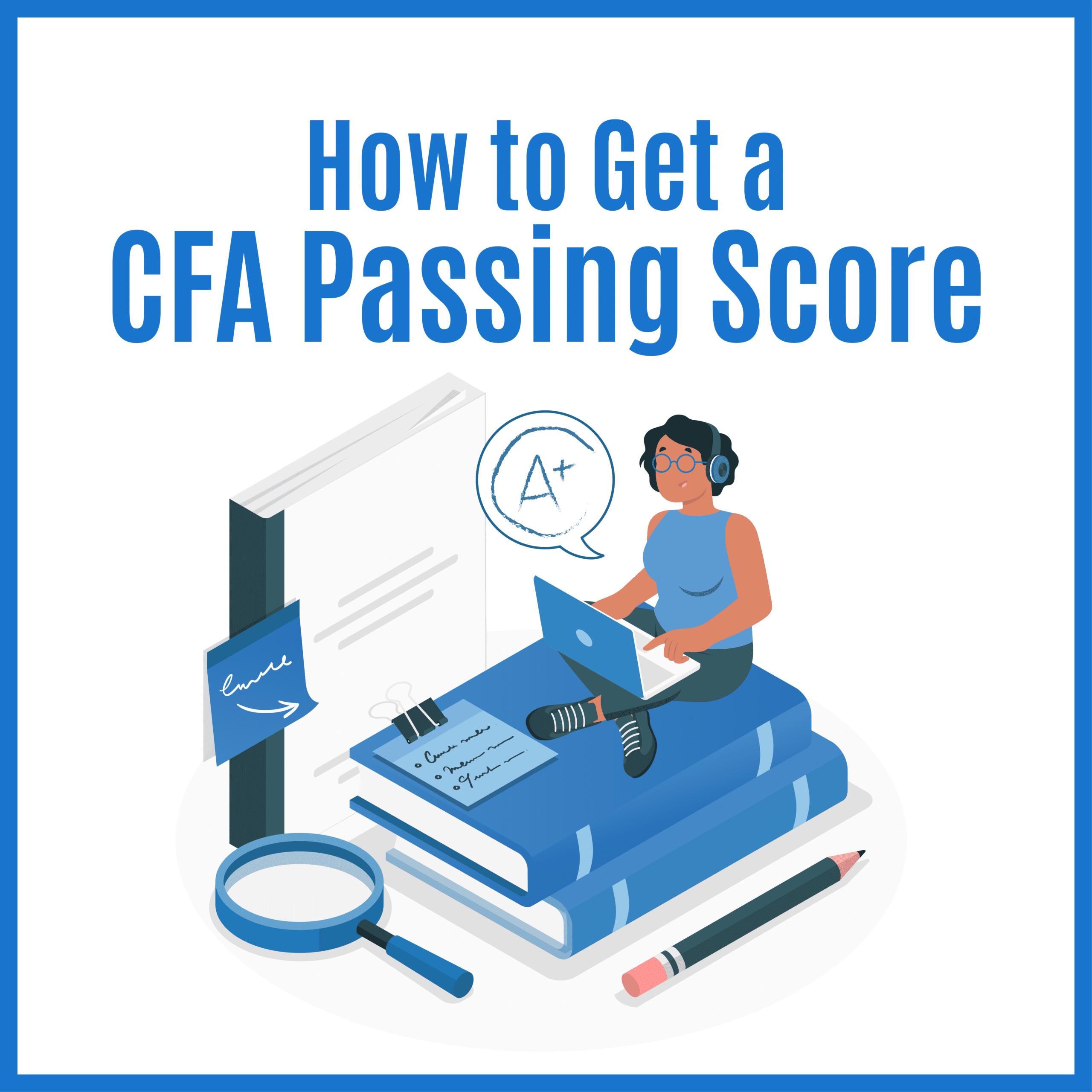
The CFA exam is one of the toughest exams out there. And if you are not prepared, you will not pass or get the CFA charter.
With historical CFA pass rates averaging around 40 percent over the years, it’s safe to say that becoming a charterholder requires more than basic knowledge of CFA concepts. Even those who study for the exam for months fail.
So, where do most people go wrong?
A Reddit thread Regarding the CFA failure, one of the posters responded:

“I didn’t start studying early enough. I was actually at the beginning of an MS finance program, and I made the dumb mistake of assuming that a lot of the material would be something I already knew.”
Other posters mentioned things like not taking mock tests, not knowing the required formulas and not sticking to their study schedule.
But don’t worry, we’re here to help. In this article, we’ll tell you everything you need to know about how to get a passing score on the CFA exam.
Getting Started: The Basics
Before we get into the specifics of CFA exam results and how to study, let’s make sure you’re on the right track to qualify.
First, you must have a bachelor’s degree from a recognized university. Secondly, you must have four years of professional work experience. And third, you must be a member of the CFA Institute.
The CFA Institute recommends that candidates have four years of professional work experience before sitting for level three of the exam. However, there is no minimum work experience requirement for Level I or II.
If you meet all these requirements, you can take the CFA exam.
Now that we got that out of the way, let’s move on to the test.
The CFA Exam: An Overview
To clear the CFA exam result, you need to understand the structure of the exam.
There are three levels of the CFA exam: CFA Level I, CFA Level II and CFA Level III. There are three levels you must pass to become a Certified Financial Analyst. Each CFA level of the exam becomes progressively more complex, so it’s important to be prepared for the grading process.
The CFA Level I exam is given through a computer based exam and you will have six hours to complete it. You will be tested on your knowledge of investment management, financial analysis and portfolio management.
The exam has a total of 180 multiple-choice questions and you need to get a minimum passing score (MPS) of 70% to pass. A numerical score is provided via a score report after a few weeks.
Level II consists of a 22-item set consisting of vignettes. It consists of 88 multiple choice questions.
As of February 2023, the structure of CFA Level III is slightly different from the previous exam administration. Each test session will include a set of constructed response (essay questions) mixed with 44 multiple-choice items based on vignettes.
Passing score
To pass the CFA exam, candidates must achieve passing scores on each of the three exams. The passing score for each exam is set by the CFA Institute Board of Governors and is based on previous exam results.
Candidates must obtain a minimum passing score (MPS) of 70% on multiple-choice questions on the CFA Level I exam, a minimum passing score of 65% to 70% on multiple-choice questions on the CFA Level II exam, and a minimum passing score (MPS) of 60% on multiple-choice questions on a CFA Level III exam. . In addition, candidates must achieve a minimum passing score (MPS) on the essay portion of the CFA Level III exam.
Individual candidate scores vary and the pass rate for each CFA level looks slightly different. CFA Level 1, for example, has a historical pass rate of 37%. The pass rate for CFA Level 2 is slightly higher at 40%. But the pass rate for CFA Level 3 is 48%. Pass or fail rates are published annually to show a consistent benchmark.
As important as knowing the exam structure and candidates’ passing scores is, unfortunately, it is not enough.
Passing Score Tips
There are a few other things you should do throughout the exam to increase your chances of getting a passing score on the CFA exam.
Let’s cover some basics of a successful test taker.
Know the content
This may seem like a no-brainer, but you’d be surprised how many people attempt the CFA exam without actually knowing the material. If you want to pass, you need to make sure you know things inside and out. How did you do this?
Make sure you use high-quality study materials. The CFA Institute provides lots of free resources and past exam information on its website. However, they make it very clear that these assets are not enough to ensure a minimum passing score in the exam or help you become a Chartered Financial Analyst.
What you really need is a course that not only provides study material but also teaches quantitative methods to crack the exam. You also need a personalized study schedule that you can stick to. Otherwise, you’ll try to cram everything in at the last minute – you’ll just end up stressed and overwhelmed.
This is where a top CFA preparation course can come in handy. Fortunately, they are offered for the CFA Level I exam, CFA Level II exam, and CFA Level III exam.
Start studying early, and you’ll give yourself plenty of time to learn the material.
Take the CFA practice test
While there’s no substitute for taking the actual CFA exam, you can make sure you’re as prepared as possible by taking practice exams under mock exam conditions. This will help you get used to the exam format and identify areas where you need more study.
CFA mock exams can be a great way to find out what topics you need to focus on, so feel free to experiment until you feel comfortable with the format.
Many CFA study courses provide access to mock exam questions as well as CFA exam question banks. This helps examinees know what to expect on exam day. Some even offer a money-back guarantee for those who don’t achieve the minimum passing score.
Answer each question
This may seem like obvious advice, but it’s important to make sure you answer every question on the exam even if you’re not sure of the correct answer. There are no penalties for guessing, so you can take one shot at each question.
Doing so helps increase the pass rate in the CFA exam.
You will want to review the requirements of a question before reading the actual situation. You can use this technique especially for ethical and professional quality questions. CFA candidates who take their time to do this while conducting the exam are much more likely to get good sales exam results.
They are also more likely to be CFA charterholders.
Use the process of elimination
Stuck on a question? Passing candidates use process of elimination to secure passing test scores.
If you are unsure of an answer to a question, try to eliminate any obviously incorrect answers. This can give you a better chance of guessing the correct answer.
Again, this may sound simple, but many times, it’s our knee-jerk reaction to not knowing the answer to a particular test question. Exam results can be better if wrong choices are eliminated.
Don’t waste time on difficult questions
If you find yourself stuck on a difficult question, it’s okay to move on and come back to it later. However, you don’t want to spend too much time on difficult exam questions and run out of time for the rest of the exam.
Here are some tips to help you get a passing score on the CFA exam. Just remember that the most important thing is to be prepared. If you study hard and work, your pass rate is more likely to increase.
Comparison of CFA study materials
How to Get a CFA Passing Score FAQ
The MPS, or minimum passing score, is not actually published by the CFA Institute. So there is not really a set number of questions required to pass the CFA. In fact, the MPS may vary slightly from year to year based on the difficulty of the questions. However, shooting for a passing percentage of 70% or higher is generally considered optimal.
It is possible but not likely. This is considered a borderline MPS line score as the normal pass rate is around the 70% mark. However, the actual pass rate is not disclosed by the CFA Institute. This means that scores below the 70% score range can still pass depending on the difficulty of the test.
The pass rate for the CFA Level I exam is historically low because it is a difficult exam. The breadth of topics covered is vast. This means that CFA charterholders must devote a lot of study time to pass the CFA exam results.



